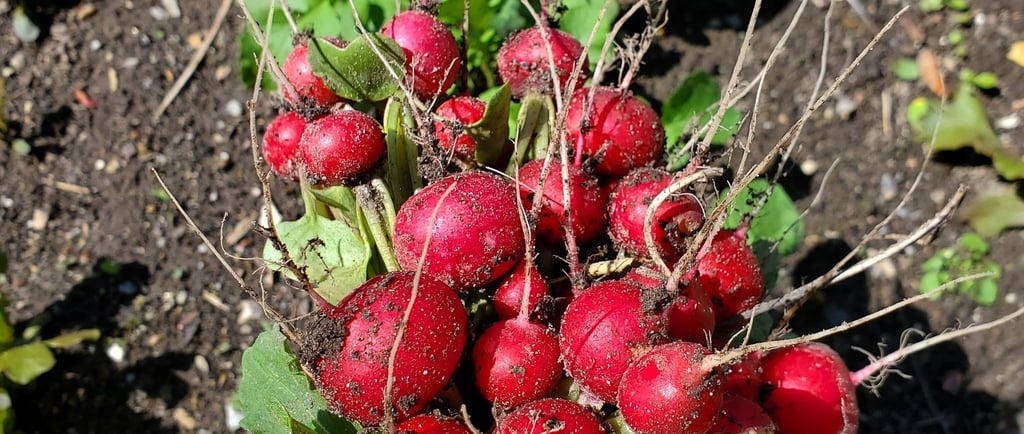Hot Topic: Organic Foods
Is organic healthier? Learn more before you pay a premium.
NUTRITIONGETTING ORGANIZEDMONEY-SAVING TIPS
Jessica Collins
4/17/20255 min read


The debate between organic and conventional foods and ingredients is a topic that tends to stir strong opinions, and has been going on for decades now. Let's dig a little deeper.
If you're new to this topic, 'organic' refers to foods that are produced without synthetic products (like fertilizer, pesticides), and also excludes GMO (genetically modified organisms). Conventionally grown foods do allow the use of synthetic products. Most single-ingredient conventionally farmed foods are still not GMO, as there is a limited list of such products that have obtained USDA approval. Many organic farmers use natural alternatives (derived from compounds found in nature) to control pests, fungi, and weeds rather than synthetic products (created in a laboratory). Many people choose organic because they feel safer eating foods that have been treated with naturally derived products compared to those developed in labs.
[Side note: if you're interested in learning more about GMO's, the USDA has a full list of crops that are approved, describes how they are modified from their natural state, for what purpose, and how they may enter the food chain (as animal feed, as human food, etc). That can be reviewed here: https://www.fda.gov/food/agricultural-biotechnology/gmo-crops-animal-food-and-beyond]
Ok, so which is better for you? From a nutrition standpoint (macronutrient content and micronutrient content), when picked at the same stage of ripeness, the same fruit or vegetable contains equal nutrition. A strawberry is still a strawberry, a tomato is still a tomato, a potato is still a potato. A good rinse with fresh water (and maybe a soft-bristle brush for firmer veggies) is advised for produce that has an edible skin.
So, why do people choose to pay extra for organic? The fear of pesticide residue and the marketing that has promoted organic as "healthier" is persistent. People often have a picture in their mind of organic farming being easier on the environment, and often picture an 'organic farm' as a large garden, with people working diligently to pull weeds, pick off insects one by one, using minimal products of any sort, working to improve soil health and conserve water use. In truth, large-scale organic farming (how most organic we find in the grocery store are grown) closely resembles large-scale conventional farming these days, in terms of creating large swaths of tilled earth, large chunks of land under monoculture (limited biodiversity) and irrigation, and widespread use of sprays and dusts, albeit ones that are extracted and concentrated from natural sources. Commercialization of organic farming has moved the industry far away from the small-scale local organic gardening movement that most people picture.
How to choose? With limited budgets, what is the best option for someone whose ultimate goal is to minimize exposure to harmful chemicals and/or support a more environmentally friendly food producer (or simply to support farmers who wish to minimize their own personal exposure to potentially harmful chemical compounds)?
Certainly, if you have the space, time, and energy, growing your own garden is one potential solution - seeds, sets and young plants are relatively inexpensive, and you would know exactly what is or isn't being used on your specific food, and planting with an eye toward creating a slight surplus, you could can, freeze, or dehydrate most home-grown foods. Yes, it's a lot of work, and you will also require tools to get started the first time with both gardening and food preservation - if possible, find a local mentor that is familiar with the challenges of your specific locality so that you can learn from their experience rather than through making your own mistakes.
Support local farmers through CSA (community-supported agriculture) programs, you-pick farms and orchards, or being a regular at your local farmers market(s) - where you can talk to the actual farmers to find out their approach. Are they using the occasional product as part of a responsive approach (like, waiting until they see a problem before they treat it), are they using organic or synthetic products, and when did they last apply it? Some might not appreciate an interrogation, but others love to talk about their gardens - just be mindful of other paying customers.
Look for seasonal local foods at your normal grocery store; many chain stores will set apart an area for local veggies and fruits. Be aware of what is in season for your locality. With the global food market we've developed in the past 20-30 years, we are accustomed to having access to all types of produce at all times of the year and shopping locally may feel limiting at first.
You don't have to go 'all or nothing' if you're choosing to eat more organic food. There are lists like 'the dirty dozen' or 'the clean fifteen' that can help you prioritize which specific items might be better to choose organic for and which might not matter as much, based on standard practices for growing those crops.
What about organic meat, eggs, or dairy? In order to be labeled 'certified organic', the animals from which these foods are harvested must be fed only organically sourced feed (or pasture), may not be fed or injected with synthetic hormones, and may not be treated with antibiotics. That seems like a great concept at face value, and again, the specific approach may vary between farmers. Again, I'd encourage you to develop a relationship with a local farmer if you can, so you know their standard practices (and how they might vary from the industry standard) before making a judgment. For some livestock species, hormone treatment is not approved at all (so it's like labeling a cucumber as gluten-free - all cucumbers are naturally gluten-free, and while it's true that this cucumber is gluten free, it is also meaningless in terms of differentiating one from another).
In terms of antibiotics, fear-driven marketing would have us believe that conventionally farmed livestock are irresponsibly fed antibiotics wholesale and that we are ingesting unnecessary antibiotics from these foods/ingredients. In truth, responsible use when situationally appropriate is (in my opinion) an ethical farm management decision from an animal comfort and health standpoint, so it would be worth asking the farmer if they use medicated feed (and if so, is it specifically intended to prevent an illness that is especially prevalent in their specific region), what happens if one of their animals gets sick - do they choose not to treat infection in their herd/flock (and just euthanize animals or isolate individuals who get sick to see if they get better on their own), or do they treat those animals for illness and remove them from their 'certified organic' herd/flock to be put into the conventional food chain once well again once the product's stated 'withholding period' has been exceeded, if it's an illness that can be treated.
If you aren't sure what farms, farmer's markets, you-pick orchards, farm stands, or CSA's are available in your area (and you're in the USA), check out https://www.localharvest.org/ to see what might be in your area.
Finally, what about 'organic certified' processed foods? All of the ingredients of a processed food that is labeled as certified organic must be certified organic themselves. There won't be any GMO ingredients in them by default (if that's important to you), and you will pay a premium for these products as well, whether the raw ingredients are more expensive to source and grow or not. Again, though, the macronutrients and micronutrients of one chocolate chip cooking compared to another are probably not all that different (though there will be more variety between brands of processed foods based on the manufacturer's choices related to how they want the end product to taste and feel, and how big they are, as compared to similarly sized tomatoes or strawberries), and your choice will be more a values-based choice than a nutritional choice - as with produce, meat, dairy, or eggs, it's more a way of using your dollar to make a statement than about whether or not it's better for you.
Wellstring Nutrition and Wellness
Resources to keep your healthy lifestyle affordable.
Contact
Support
jessica@wellstringnutrition.com
(434) 222-4177
© 2025. All rights reserved.
This site may contain affiliate links
